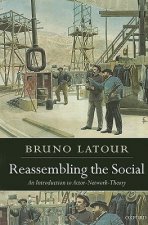
Kód: 06623598
Paradoxical Effects of Social Behavior
Autor A. Diekmann, P. Mitter
In the history of science "paradoxes" are not only amusing puzzles and chal lenges to the human mind but also driving forces of scientific development. The notion of "paradox" is intimately related to the notion of "contradiction" ... celý popis
- Jazyk:
 Angličtina
Angličtina - Vazba: Brožovaná
- Počet stran: 344
Nakladatelství: Springer-Verlag Berlin and Heidelberg GmbH & Co. KG, 1986
- Více informací o knize

3039 Kč

Skladem u dodavatele v malém množství
Odesíláme za 10-15 dnů
Potřebujete více kusů?Máte-li zájem o více kusů, prověřte, prosím, nejprve dostupnost titulu na naši zákaznické podpoře.
Přidat mezi přání
Mohlo by se vám také líbit
-

Ideals and Illusions
786 Kč -

Essentials of Hypnosis
5860 Kč -

Community Development in Asia and the Pacific
5305 Kč -

Language, Ideology and Japanese History Textbooks
4475 Kč -

Information Needs and Uses of the Informal Economy of Uganda
2192 Kč -

Fliegelman's Desire
286 Kč -

NC-Programmierung
1950 Kč
Darujte tuto knihu ještě dnes
- Objednejte knihu a zvolte Zaslat jako dárek.
- Obratem obdržíte darovací poukaz na knihu, který můžete ihned předat obdarovanému.
- Knihu zašleme na adresu obdarovaného, o nic se nestaráte.
Více informací o knize Paradoxical Effects of Social Behavior
Nákupem získáte 304 bodů
 Anotace knihy
Anotace knihy
In the history of science "paradoxes" are not only amusing puzzles and chal lenges to the human mind but also driving forces of scientific development. The notion of "paradox" is intimately related to the notion of "contradiction". Logi cal paradoxes allow for the derivation of contradictory propositions (e.g. "Rus sell's set of all sets not being members of themselves" or the ancient problem with propositions like "I am lying" 1), normative paradoxes deal with contradic tions among equally well accepted normative postulates (Arrow's "impossibility theorem", Sen's "Impossibility of a Paretian Liberal") and "factual" paradoxes refer to conflicts between conventional opinion based on an accepted empirical theory and contradictory empirical evidence (e.g. the "St. Petersburg paradox" or the "Allais paradox" in decision theory2). Paradoxes, either logical, normative or factual, also contradict our intui tions. The counter-intuitive property which seems to be a common feature of all paradoxes plays an important part in the empirical social sciences, particularly in the old research tradition of scrutinizing the unintended consequences of pur posive actions. Expectations based on naive theories ignoring interdependencies between individual actions are very often in conflict with "surprising" empirical evidence on collective results of social behavior. Examples are numerous reach ing from panic situations, the individual struggle for status gains resulting in collective deprivation, the less than optimal supply of collective goods etc. to global problems of the armament race and mismanagement of common resources.
 Parametry knihy
Parametry knihy
Zařazení knihy Knihy v angličtině Society & social sciences Sociology & anthropology Sociology
3039 Kč
- Plný název: Paradoxical Effects of Social Behavior
- Podnázev: Essays in Honor of Anatol Rapoport
- Autor: A. Diekmann, P. Mitter
- Jazyk:
 Angličtina
Angličtina - Vazba: Brožovaná
- Počet stran: 344
- EAN: 9783790803501
- ISBN: 9783790803501
- ID: 06623598
- Nakladatelství: Springer-Verlag Berlin and Heidelberg GmbH & Co. KG
- Hmotnost: 710 g
- Rozměry: 244 × 170 × 20 mm
- Datum vydání: 01. January 1986
Oblíbené z jiného soudku
-

Wanderlust
395 Kč -

Surrendered Wife
258 Kč -

Why Love Hurts - A Sociological Explanation
433 Kč -

Braving the Wilderness
220 Kč -

Becoming Partners
342 Kč -

Brothers and Sisters
380 Kč -

Future Of Money
408 Kč -

Fair Play Deck
447 Kč -

Sex at Dawn
347 Kč -

Regretting Motherhood
348 Kč -

Theory of the Leisure Class
283 Kč -

Social Intelligence
337 Kč -

NINETY PERCENT OF EVERYTHING
376 Kč -

Tragedy and Hope
1430 Kč -

Gifts of Imperfection: 10th Anniversary Edition
568 Kč -

World-Systems Analysis
510 Kč -

Critique of Everyday Life
926 Kč -

Post-Adoption Blues
415 Kč -

Birth Of A Mother
551 Kč -

Craftsman
283 Kč -

Disappearance of Rituals
444 Kč -

Dying for Ideas
334 Kč -

Qualitative Research and Theory Development
1133 Kč -

Social Change in a Peripheral Society
799 Kč -

Creating a Learning Society
526 Kč -

Treatise on the Family
1613 Kč -

From Benito Mussolini to Hugo Chavez
1018 Kč -

Being Mortal
435 Kč -

Enquete Sur Les Modes Dexistence
935 Kč -

Return to Meaning
1328 Kč -

Tragedy and Hope
1121 Kč -

Intimate Communion
321 Kč -

Cartoon Guide to Statistics
468 Kč -

Book of Tea
233 Kč -

More Than Two
774 Kč -

Small Is Beautiful
258 Kč -

Bushido the Soul of Japan
288 Kč -

World of Sex
159 Kč -

Eroticism
261 Kč -

Past Mortems
233 Kč -

Cruel Optimism
691 Kč -

Population Control
334 Kč -

Reassembling the Social
957 Kč -

Class Ceiling
307 Kč -

Chrysanthemum and the Sword
439 Kč -

Family and Civilization
477 Kč -

Intercourse
358 Kč -

Sociology: A Very Short Introduction
233 Kč -

Being Mortal
333 Kč
Osobní odběr Praha, Brno a 12903 dalších
Copyright ©2008-24 nejlevnejsi-knihy.cz Všechna práva vyhrazenaSoukromíCookies


 Vrácení do měsíce
Vrácení do měsíce 571 999 099 (8-15.30h)
571 999 099 (8-15.30h)